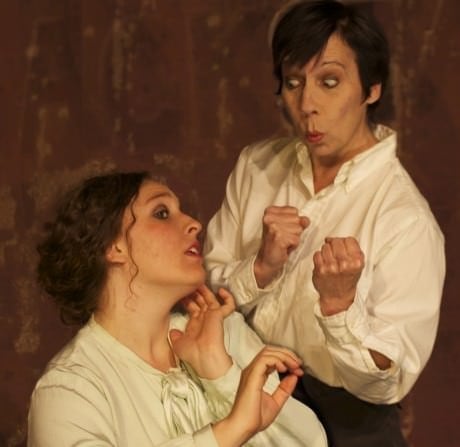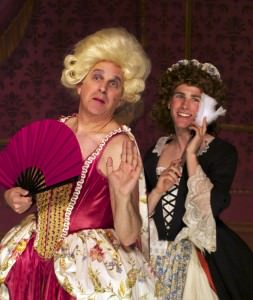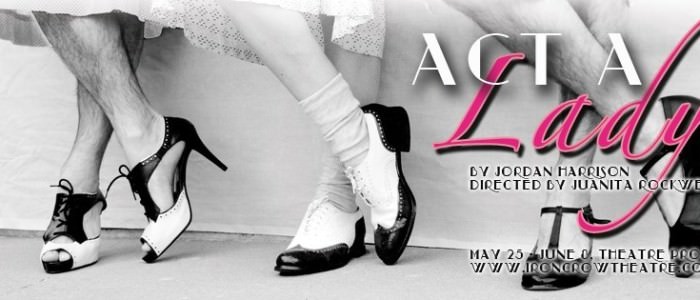There’s no trick to acting a lady, you simply need less as if your whole existence fatigues you. This great notion is a poignant point of exploration as Iron Crow Theatre Company closes out their season with Jordan Harrison’s Act A Lady, a rivetingly humorous work that delves deep into the gender lines of what defines us as men and women. Directed by Juanita Rockwell, this nearly laugh-a-minute comedy is not only a hilarious ride but a uniquely thought-provoking approach to genergy— the energies of the male and female genders— and how we perhaps all have a little woman inside of us.

The men of a small prohibition era town come together and decide to put on a play dressed in “fancy-type women-clothing” and the result is an eyebrow-raising, identity-exploding comic adventure that forever entwines life with art in ways previously never thought possible. Accompanied by an accordion this exuberant Midwestern-style fable-tale is good clean fun in drag for the whole family.
They say the clothes may make the man and in this case they certainly make the man a woman. Costume Designer Julie Heneghan pulls out all the stops as the boys slip into corsets and ‘delicates.’ The full-body padded bustle dresses are lavish and laughable all in the same go, making them more than fitting for this production. Heneghan keeps the women’s outfits simple, even more so when they don their beaux’s britches. She creates a perfectly clear split down the gender line in regards to women’s finery and the simple working garb for the masculine, and masculine at heart.
Set Designer Daniel Ettinger adds to the hilarity and ease of the show’s many stage transitions by crafting the sets primarily on painted backdrop curtain. This allows for both intricate detail, a minimization of props and a lovely showcase of his fine artistic talents. The haunting trees behind three layers of curtains for the late night rendezvous scene are his finest work.
Director Juanita Rockwell really hones the focus of the cast in this production. With a small cast of just six she is more thoroughly able to properly explore the main points of the performance. Her smashing success comes during scenes where the women actors are playing their male foils while said male characters are dragged up in their ‘play’ women characters. The juxtaposition of seeing these identities flushed against one another in scene is both astonishing and bizarre but in a deeply ponderous manner, really allowing you to absorb the notion that one is not simply a man or a woman, especially when playing a different gender on the stage. That these characters of a different gender walk alongside the individual, are inside their head and exist just as real as the themselves do.
The three women in the production are distinctly defined by their stereotypes; the butch masculine director, Zina, the nagging do-gooder wife, Dorothy, and the gooey-eyed dreamer girl, Lorna. At varying points throughout the production all of these characters shift and transform, accepting the fact that they are not merely women as defined by society but perhaps something more, maybe even with a little man rooted inside of them. All six of the performers, male or female, master their nearly-Canadian upper-northern territory accents to flawless perfection, some going above and beyond to master gruff broken French and drawing room finery for other moments on the stage.

Lorna (Caitlyn Joy) drifts dreamily in and out of the scenes but is legitimately grounded in her own reality despite initially appearing as aloof and spacey. Joy embodies the most stereotypical essence of feminism, with the intent to use her feminine wiles to sway the mind of the sheriff. Her subtle flirting with True is sweet and blissful, and her physical transition when embodying ‘True’ is done with great ease.
Zina (Julie Herber) is the epitome of a masculine woman. Wearing britches and speaking in her gruff manner, her purposeful male-like gait and overall physicality bends the mind around the notion that not all women are airy fairy bits of flouncing fluff. The beautiful irony is that when Herber plays Casper, the gender-curious youth, her characterization and physicality softens into something easily identifiable as feminine, letting an even deeper level of meaning transcend the character’s existence. Excellent with well-placed quips and zingers, Herber brings a great deal of comedy to her role as metaplay’s director.
Finishing out the women is Dorothy (Gina Braden). With a staunch and devout approach to ‘right and wrong’ in the name of the holy father and whatnot she still reads as ideally feminine. Her accent is the most noticeable among the group, really giving the audience an idea of where the play is set. Braden’s singing and nimble accordion playing fingers make for added entertainment during the production. Her ability to take the rigid belief her character has in how art factors into existence and shift that subtly into her moments as ‘Miles’ is really an astonishing sight to behold.
But it’s the men folk that drive this production to its highest hilarity and its deepest moments of clarity. True (Steve Sawicki) is so called because he only ever tells the truth, and ironically enough he seems most at ease when flipping from his working class man into the haughty and regal Countess Romilde. Sawicki goes through the motions of adjusting to his new feminine physicality until he’s properly suited in them, making his progression realistic. Sawicki’s approach to the male-female bending line is simply that there may be a little woman inside all of us, though he more subtly toes the expectations of society in regards to how to act as a man or a woman.
Miles (Steven J. Satta-Fleming) is a simple man with an artistic vision. His moments spent as the brooding lover Lady Romola, however, are some of the most uproarious in the production, especially when he starts stalking about as the jilted ghost screaming “Snood!” and prowling for her stolen emerald. His scenes in the metaplay are laced so heavily with melodrama it would be labeled bad soap opera acting if it wasn’t outrageously hysterical. Satta-Fleming has a natural air to his stage presence that allows both his male and female characters to exist in reality, even if his female character’s reality is that of an upper class loony lady. His interactions with everyone in the production set the tone for the production overall; nothing too serious, but plenty to think about while laughing.
Casper (Alec Weinberg) gives a stunning performance as the young gender-curious male playing the flirtatious and silly maid Greta in the metaplay. Weinberg’s prancing and sashaying as Greta is an exuberant example of overdone femininity, while his more subtle and graceful floating existence as Casper is more of a reflection of a youth still discovering his burgeoning sexuality. Weinberg’s performance presents the audience with the notion that we all die a little death every time we conceal our true desires. There is a stunning moment when Weinberg’s male character slips out of his masked personality that he has created for himself, laying his head on True’s shoulder in delight and for that moment the character’s soul simply shines through the expression on his face; the turning point of the show.- a brilliant performer to embody such contrasting roles.
So grab your petticoats, and heck, your britches too, it’s just art, after all. And art exists so that we can see something in a different way, even if we thought we knew how to look at it all along. Come find yourself during this great comic production of Act A Lady, and who knows, maybe you’ll discover your inner girl.
Running Time: Approximately one hour and 45 minutes, with one intermission.
Act A Lady plays through June 8, 2013 at Baltimore Theatre Project – 45 West. Preston Street, in Baltimore, MD. For tickets call (443) 637-2769, or purchase them online.





